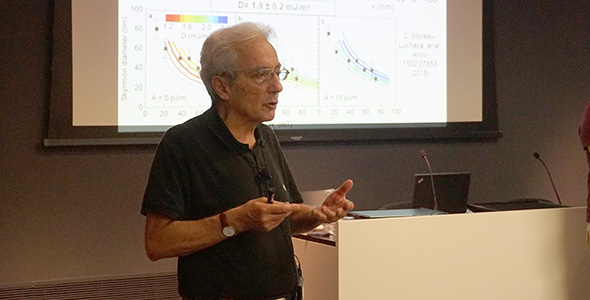The Nobel Prize awardee and member of the ICN2 Scientific Advisory Board offered on November 11, 2015, a Manuel Cardona Lecture entitled “Spin-orbitronics, a new direction for spintronics”. Afterwards he participated in a tour through the ICN2 involving different Groups and a lively discussion during a friendly lunch.

Prof Albert Fert, Emeritus Professor at Université Paris-Sud (France), Scientific Director of Unité Mixte de Physique CNRS/Thales (France) and Member of the ICN2 Scientific Advisory Board, visited ICN2 in November 11, 2015. He offered an ICN2 Manuel Cardona Lecture entitled "Spin-orbitronics, a new direction for spintronics", where the latest advances regarding magnetic skyrmions and the Spin-Orbit Coupling were reviewed. Both the Lecture, that was presented by Prof Pablo Ordejón, the Director of ICN2, and the discussions he had afterwards with the ICN2 researchers were a gift for curious minds. The visitor also offered a video interview that is now being edited and will be shared soon through the ICN2 Youtube Channel.
The Nobel Prize in Physics 2007 was awarded jointly to Prof Albert Fert and Prof Peter Grünberg for the discovery of Giant Magnetoresistance, which brought about a breakthrough in gigabyte hard disks. Prof Fert has also made many contributions to the field of spintronics. The speaker is an outstanding figure that keeps developing a very active career as a researcher. He offered a talk oriented to inspire those researchers with a high level of expertise in spintronics. The seminar was part of the ICN2 Manuel Cardona Lectures, a series of lectures inviting some of the most prominent researchers in nanoscience-related fields and a tribute to Prof Manuel Cardona, a key figure in the history of this Institute.
Classical spintronic devices use the exchange interaction between conduction electron spins and local spins in magnetic materials to create spin-polarized currents or to manipulate nanomagnets by spin transfer from spin-polarized currents. A novel direction of spintronics - that can be called spin-orbitronics - exploits the Spin-Orbit Coupling (SOC) in nonmagnetic materials instead of the exchange interaction in magnetic materials to generate, detect or exploit spin-polarized currents. This opens the way to spin devices made of only nonmagnetic materials and operated without magnetic fields. SOC can also be used in magnetic materials to create new types of topological objects as the magnetic skyrmions or the Dzyaloshinskii-Moriya domain walls.
After a short introduction on spintronics and some of its applications, Prof Fert reviewed in his talk recent advances in two directions of spin-orbitronics: Magnetic skyrmions and Conversion between charge and spin currents by SOC.
The magnetic skyrmions are topologically-protected localized spin windings that exhibit fascinating physical properties and present large potential in highly energy efficient applications for the storage and processing of information. Up to now however they had been observed only at low temperature in a few exotic materials and ultra-thin films. Prof Fert showed that they can be found at room temperature in multilayers in which the symmetry breaking by interfaces induces strong Dzyaloshinskii-Moriya Interactions (DMI). These findings open the road to room-temperature skyrmion spintronics.
On the other hand, he presented a review of spin-orbit effects allowing the conversion of charge current into spin current (or vice-versa), by the Spin Hall Effect in bulk materials or by similar effects in two dimensional electron gas at Rashba interfaces or in topological insulators. Prof Fert discussed the motion of magnetic domain walls and switching of nanomagnets by the resulting current-induced SOC torques.
After the Lecture, Prof. Fert participated in a tour through the ICN2 facilities, including visits to the laboratories led by ICREA Prof Sergio O. Valenzuela, Dr. Aitor Mugarza, CSIC Research prof Jordi Fraxedas and ICREA Research Prof Josep Nogués. The visit ended with a friendly lunch which will hopefully be the seed of a fruitful collaboration.

